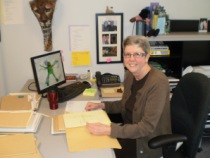Finding Remarkable History in the Files
 Gwenna Moss is a CCS volunteer who has been helping to clean up and organize the files of our former students and graduates. Here is a story from her about why it sometimes takes longer than you would expect:
Gwenna Moss is a CCS volunteer who has been helping to clean up and organize the files of our former students and graduates. Here is a story from her about why it sometimes takes longer than you would expect:
I think most of you know that I find the files very interesting. I also find it perhaps too easy to get diverted when I am dealing with them – and following a trail off the main road. Here’s an example of one of my more interesting recent trips.
I came across the file of Wilna Thomas. It didn’t have much in it, but what was there suggested this might be a woman worth checking out. The file showed her born in Ogema, SK, an honours degree in economics from the U of Sask, graduation from United Church Traing School (forerunner of CCS) in 1940, becoming the first woman appointed as a chaplain in the Canadian Women’s Army Corps. Her file contained a request for a reference in 1946 – she proposed to study at Union Seminary in New York using her DVA (Dept. of Veterans Affairs) entitlement. A later note said she had been with Women’s Missionary Society in Japan, then on staff of Board of Mission, the first woman professional staff person. The last note said she was studying social work at UBC.
So I googled her.
Bingo!
Up came Camosun College in Victoria which has a Wilna Thomas Building. I contacted Camosun College and got the details. A bequest of Wilna’s started the ball rolling for a cultural centre for all students. I have photos of the dedication plaque. The College also put me in touch with retired faculty members who remember Wilna fondly. I spoke with one woman who had started the first day care at the U of Toronto. Wilna recruited her to do the same at Camosun and they became fast friends. She told me some interesting details of Wilna’s life including the continuing relationship she had with the Japanese students she taught. They once took up a collection to bring Wilna to Japan for a reunion. When Wilna was dying a delegation of students went to Victoria — with a tape recorder – and asked her to send a message back to the others in Japan. Wilna sat up, literally in her death bed, and gave a speech in Japanese.This friend said to Wilna (from her Toronto/Victoria perspective!): “You came from a little tiny town in Saskatchewan. How did you learn to be such a good administrator and organizer and leader?” “CGIT”, Wilna said. “It was my experience in CGIT”.
The google also turned up Wilna’s involvement in starting a day care in her church (Centennial UC in Victoria).
These folks also put me in touch with the daughter of the woman who might be CCS’s oldest graduate – she celebrates her 100th birthday in September – a classmate of Wilna’s. The daughter studied for a Masters of Social Work with Wilna, as well, and they worked together in social work in Vancouver’s East side.
When we are in Victoria in Feb-March I plan to visit the College and these friends of Wilna’s. One of them has 100 photos of her earlier life (predating Camosun) and is interested in seeing that they get to an appropriate place – either CCS or the United Church Archives. So I will likely return with photos. I already have a book Wilna put together of her letters to her Japanese friends after she returned to Canada. There are 2 other books about her but I haven’t been able to track them down yet.So this explains, in part, why there are still some jobs left to do with the files!
Thanks Gwenna, for your devotion, your love of history (and the often buried stories of women), your commitment to CCS, your investigative curiosity, and your gracious enthusiasm for life! And thank God for Wilna Thomas!





